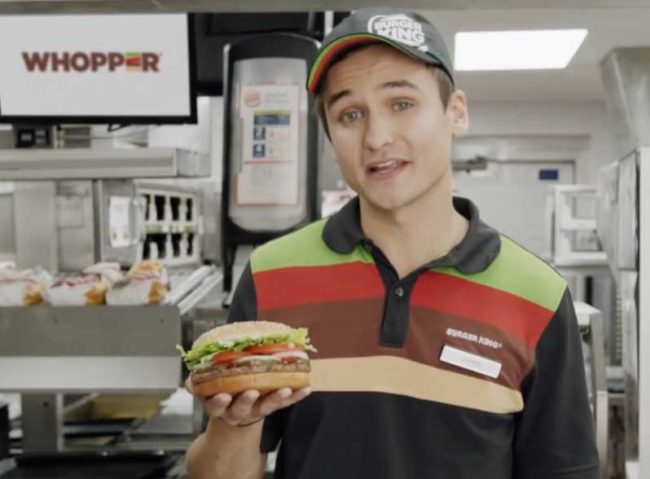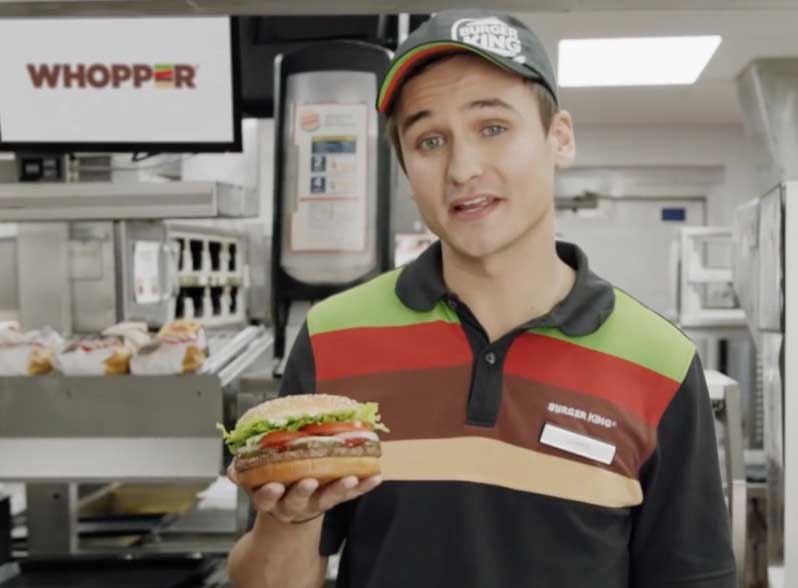 Google Home is a voice activated internet connected speaker. The idea is that you can ask questions and also get it to do things such as turn lights on and off (assuming you have them configured them to be part of the IOT). Hey, sounds neat.
Google Home is a voice activated internet connected speaker. The idea is that you can ask questions and also get it to do things such as turn lights on and off (assuming you have them configured them to be part of the IOT). Hey, sounds neat.
Ah but wait, what happens when advertisers twig to the observation that people now have voice activated devices in their homes?
Burger King just tried that, and so this is a first.
They created an ad that was designed to leverage this new reality. It is basically a 15 second ad that contains the line “Ok Google, what is a whopper burger?”. The Washington Post describes it as follows …
The ad, released Wednesday, features an actor dressed as a Burger King employee, who says, “Okay, Google: What is the Whopper burger?” The line is meant to trigger the device to reel off the definition of a Whopper using the first line of the burger’s Wikipedia page. (Yes, the Whopper has its own Wikipedia page.)
It worked, but only for three hours. The fact that it was blocked may in fact be a benefit to Burger King because one thing they forgot is that anybody can edit Wikipedia and thus alter the line that Google Home would read out.
Accidental triggering of Home Hubs has happened before but this is the first deliberate attempt to do this. So how did people react? Many were basically pissed to find that their home hub had been hijacked like this, and some even called it “Hacking” …
Wikipedia users began altering the first line of the article about Burger King’s Whopper. These edits included references to the burger as “cancer-causing” and stating that its ingredients include “cyanide.”
It appears that Burger King itself tried to fix the Wikipedia problem. The first sentence changed to a suspiciously glowing description of the Whopper, authored by user “Fermachado123″ — a name that sounds similar to Fernando Machado, Burger King’s senior vice president for global brand management.
If you check out the talk section of the whopper page, you will find that there was some serious debate about banning him.
To be honest, if some bit of technology I owned in my home had been hijacked for advertising like this, the word “annoyed” does not even begin to describe my reaction. What comes to mind are several well known anglo Saxon phrases that I’ll not commit to print.
I get that they want to innovate and also find new ways to reach out, but this is really not the way to do it. It is perhaps inevitable for pioneers that sometimes you will end up lying vertical out in the wilderness with a few arrows sticking out of your back. In this case, Burger King is perhaps one such example of this.
Comments from under the Washington Post article do confirm that reaction to this, it is not just me …
I get the concept of integrating technology in a clever way, but if this was me, and my house, I would be annoyed if a tv advert suddenly made something in my house do something. I see that close to an invasion of privacy.
This kind of ad is even less acceptable than robocalls. While telemarketing is currently ramped up to insanity, it’s an extinction burst; it won’t be a viable industry in another couple years. Advertisers need to understand that this kind of behavior will place them next in line for obsolescence.
Hacking people’s personal assistants sounded like a good idea how?! Brands like Burger King have lost touch with right and wrong. It feels like there’s an epidemic of bad judgement in today’s America.
We have come so far that a large corporation can invade one’s private communication device and stage a broadcast ad whether the person has requested it or not. What are the Burger King people thinking? That we’re all idiots and want to be accosted by such commercials? If this is the future of advertising – invading one’s privacy – then corporate America has sunk to new lows.
I can see a potential partnership here. United Airlines, in an attempt to re-gain customer approval, can now serve Burger King Whoppers and Pepsi on all scheduled flights.
Some commentary on it all
A few Further Thoughts
I don’t own Google Home or anything similar, and currently have no plans to ever get one. I can’t be alone in that stance, especially when we hear about some of the unintended consequences.
One such example was the story within the New York Post that reported on an accidental triggering in San Diego. Apparently a 6 year old child in Dallas ordered a $170 dollhouse and cookies via Amazon’s Alexa. A local TV station in San Diego ran the story, and as part of that report this happened …
CW6 News Morning Anchor Jim Patton was discussing the Dallas 6-year-old who accidentally ordered a $170 dollhouse and cookies via Alexa. “I love the little girl, saying ‘Alexa ordered me a dollhouse,’” he said during the Thursday report, according to CW6.
In response him him broadcasting that, Amazon Echo devices connect to the Alexa voice assistant all over San Diego starting trying to order a dollhouse. Luckily you have to actually confirm the order verbally, so none of the orders actually completed.
